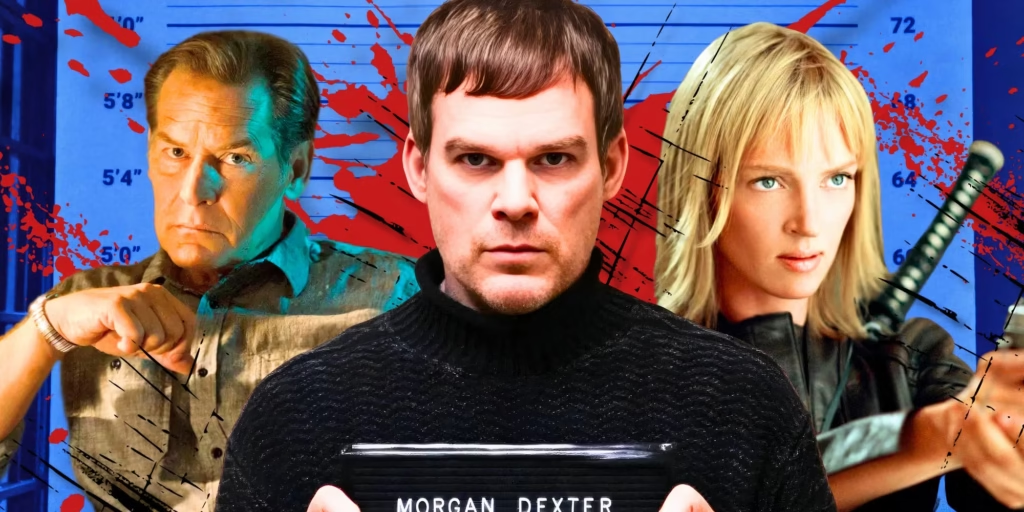
Dexter: Resurrection (2025)
Dexter: Resurrection (2025) is one of the most anticipated television series revivals of the year, blending crime, thriller, and drama. Directed by Marcos Siega, and starring Michael C. Hall, Jennifer Carpenter, and Clancy Brown, this English-language series is scheduled for release on November 1, 2025. The series continues the story of Dexter Morgan, a forensic expert and vigilante serial killer, exploring new challenges, moral dilemmas, and suspenseful criminal investigations.
Movie Overview
Dexter: Resurrection picks up several years after the events of the original Dexter series. Dexter Morgan, presumed dead after his last season, returns to Miami under a new identity while confronting a series of crimes that challenge his personal code. The show explores themes of identity, morality, and justice, as Dexter navigates relationships with former allies, new foes, and the constant struggle to control his dark urges. Combining suspenseful plotlines with intense psychological drama, the series has generated considerable excitement among fans and critics alike.

Attribute Details
- Title: Dexter: Resurrection
- Genre: Crime, Thriller, Drama
- Language: English
- Release Date: November 1, 2025
- Director: Marcos Siega
- Writer: Clyde Phillips
The Return of Dexter Morgan
Michael C. Hall reprises his role as Dexter Morgan, the complex forensic blood spatter analyst with a dark secret. His character’s return delves into the psychological depth fans have come to expect, balancing his outwardly normal life with his vigilantism. Dexter’s struggle with his “dark passenger” is central to the narrative, and viewers are drawn into the tension between his moral code and the chaos around him. The series also explores how Dexter has evolved in the years since his disappearance and how he adapts to a world that has changed without him.
Reuniting the Cast
Jennifer Carpenter returns as Debra Morgan, Dexter’s sister, providing continuity and emotional depth. Her character grapples with Dexter’s resurrection and the consequences of past actions. Clancy Brown joins the cast in a pivotal role as a law enforcement figure who threatens to uncover Dexter’s secrets. The chemistry among the returning and new cast members adds layers of drama and intrigue, enhancing both personal and procedural storylines.
New Threats and Criminal Cases
The series introduces new antagonists who challenge Dexter’s moral code and physical abilities. Serial killers, corrupt law enforcement officials, and shadowy organizations create high-stakes scenarios that push Dexter to his limits. Each episode features intricate criminal investigations, blending suspense with forensic detail. The show highlights how Dexter’s expertise and experience make him a formidable force, while also revealing the vulnerabilities of someone trying to lead a double life under constant scrutiny.
The Evolution of Dexter’s Moral Code
Dexter’s personal code, developed under the guidance of his adoptive father, Harry, continues to guide his actions. However, Resurrection explores the nuances and limitations of this code as Dexter faces morally ambiguous situations. The series asks whether a man can truly change and whether redemption is possible when one’s past is filled with dark deeds. This exploration of morality adds psychological complexity, elevating the series beyond typical crime dramas.
Visual Storytelling and Cinematic Approach
Marcos Siega’s direction emphasizes a cinematic approach to storytelling. The series features dynamic camera work, atmospheric lighting, and detailed set design to reflect both Miami’s vibrant nightlife and its dark underbelly. Visual cues enhance suspense, while close-ups on Dexter’s internal reactions provide insight into his conflicted psyche. The stylistic choices reinforce themes of duality, danger, and moral tension that are central to the series.
Soundtrack and Mood
The soundtrack of Dexter: Resurrection is designed to amplify tension and emotional depth. From pulse-pounding sequences during hunts to subtle, reflective melodies during introspective moments, the music accentuates the narrative’s psychological intensity. The combination of visuals and sound ensures that viewers experience both suspense and empathy for the characters simultaneously.
Critical Anticipation and Fan Reception
Since its announcement, Dexter: Resurrection has generated significant buzz among fans of the original series and new audiences alike. Social media discussions, trailers, and interviews have heightened anticipation. Critics have praised the series for balancing nostalgia with fresh storytelling, maintaining suspense while expanding character arcs. Fans are particularly excited to see Dexter’s evolution and how his moral and psychological dilemmas unfold in the new season.
Thematic Depth and Psychological Complexity
The series explores complex themes such as morality, identity, and the human capacity for darkness. Dexter’s dual life serves as a metaphor for the struggle between societal expectations and inner desires. Resurrection also examines the consequences of secrecy, the burden of guilt, and the search for redemption, making the show both thrilling and intellectually engaging.
Why Dexter: Resurrection is Must-Watch
Dexter: Resurrection (2025) is a must-watch for fans of crime thrillers, character-driven drama, and suspense. Its combination of a returning iconic character, new threats, complex moral dilemmas, and cinematic execution ensures a compelling viewing experience. The series successfully continues Dexter’s story while appealing to both longtime fans and newcomers seeking a high-quality psychological thriller.
The Return of Dexter Morgan
Michael C. Hall reprises his iconic role as Dexter Morgan, the complex forensic blood spatter analyst and vigilante serial killer. In Dexter: Resurrection (2025), Dexter is presumed dead but resurfaces in Miami under a new identity. The series explores how he reintegrates into society while grappling with his dark urges and the ethical dilemmas that arise from his vigilante justice. Dexter’s internal struggle between morality and his “dark passenger” drives much of the suspense, keeping viewers engaged in both his personal and professional conflicts.
Reuniting with Debra Morgan
Jennifer Carpenter returns as Debra Morgan, Dexter’s sister, adding emotional depth to the series. Her character confronts Dexter’s return with a mix of relief, suspicion, and unresolved tension from past seasons. Their dynamic highlights family loyalty, trust, and moral complexity, providing a compelling contrast to the darker criminal plots. Debra’s perspective allows audiences to examine Dexter’s actions not only through his eyes but also through the lens of those affected by his past choices.
New Antagonists and Rising Threats
The series introduces a fresh set of antagonists who challenge Dexter both physically and psychologically. From cunning serial killers to corrupt law enforcement figures, these new threats test Dexter’s expertise and ethical code. Each episode presents intricate cases that push him to confront his dark impulses while navigating increasingly dangerous situations. These evolving challenges add suspense and unpredictability, keeping viewers on edge while exploring Dexter’s strategic thinking and adaptability.
Exploring Dexter’s Moral Code
Dexter’s “code,” established by his adoptive father Harry, continues to guide his actions in Resurrection. However, the series delves into the nuances of this code, exploring the limits of morality when confronted with new dangers and personal desires. Dexter must balance his instinct for vigilantism with societal expectations, raising profound questions about justice, redemption, and the human capacity for change. This psychological depth is a key factor that distinguishes the series from standard crime dramas.
Miami as a Character
The vibrant city of Miami serves not just as a backdrop but as an active character in Dexter: Resurrection. The sunny beaches, nightlife, and bustling urban environment contrast sharply with the dark, violent events of Dexter’s vigilante activities. Cinematic techniques, such as dynamic camera angles and vivid lighting, emphasize this duality, creating a world that is both alluring and dangerous. The cityscape mirrors Dexter’s internal conflict, enhancing the series’ tension and thematic resonance.
Visual Storytelling and Cinematic Style
Director Marcos Siega employs cinematic techniques to heighten suspense and immerse viewers in Dexter’s world. The use of close-ups, shadows, and dynamic camera movements conveys Dexter’s psychological state, while meticulous set design captures both the elegance and menace of Miami. Visual storytelling is complemented by pacing that balances slow-burn tension with intense, high-stakes action, making the series visually captivating and narratively compelling.
Psychological Complexity and Character Depth
Dexter: Resurrection emphasizes the psychological complexity of its characters. Dexter’s moral conflicts, his relationships with allies and adversaries, and his internal monologues provide insight into his mind. Supporting characters, including Debra and Clancy Brown’s law enforcement figure, are equally layered, presenting ethical dilemmas, personal motivations, and vulnerabilities. This focus on character depth elevates the series beyond conventional thrillers, offering viewers an emotionally and intellectually engaging experience.
Soundtrack and Emotional Resonance
The series’ soundtrack amplifies its suspense and emotional intensity. Tense orchestral arrangements accompany Dexter’s most dangerous moments, while subtle, reflective tracks underscore introspective scenes. Music enhances the storytelling by mirroring Dexter’s psychological state and heightening the dramatic impact of key events. The careful integration of sound and visuals ensures that viewers remain fully immersed in both the tension and emotional weight of the narrative.
The Impact of Resurrection on the Dexter Legacy
Dexter: Resurrection (2025) revitalizes the legacy of the original series by introducing new storylines, characters, and challenges while maintaining the core essence of Dexter Morgan. The show appeals to longtime fans by honoring past events and character arcs, while also attracting new viewers with fresh suspense and modern storytelling techniques. This balance of nostalgia and innovation ensures the series remains relevant and captivating in today’s television landscape.
Why Dexter: Resurrection is a Must-Watch
The series is essential viewing for fans of crime thrillers, psychological drama, and morally complex characters. With compelling performances from Michael C. Hall and the returning cast, high-stakes suspense, and sophisticated narrative layers, Dexter: Resurrection offers an unparalleled viewing experience. Its exploration of morality, identity, and the consequences of one man’s dark impulses makes it a thought-provoking and thrilling continuation of the Dexter story.

Supporting Characters and Their Impact
Beyond Dexter and Debra, Dexter: Resurrection introduces new supporting characters who enrich the storyline. Characters like Clancy Brown’s law enforcement figure provide fresh tension by challenging Dexter’s dual life. Other recurring roles, such as forensic colleagues and civilian associates, add emotional stakes and social complexity. Each character’s actions and decisions intersect with Dexter’s moral code, creating intricate narrative layers that heighten suspense and deepen audience engagement.
Flashbacks and Character Development
The series frequently uses flashbacks to reveal Dexter’s past decisions, offering insight into his psychological development. These flashbacks serve multiple purposes: they provide context for current actions, enhance character depth, and foreshadow potential conflicts. By revisiting formative events and relationships, Resurrection not only honors the original series but also emphasizes the continuity of Dexter’s moral and emotional journey.
The Art of Suspense in Resurrection
Suspense is central to Dexter: Resurrection. The writers employ a combination of cliffhangers, unpredictable plot twists, and morally ambiguous situations to keep viewers on edge. Dexter’s internal monologues heighten tension, offering insight into his thought process while maintaining mystery for the audience. The series balances psychological suspense with action, ensuring that every episode is both thrilling and thought-provoking.
The Role of Law Enforcement in the Story
Law enforcement is both an ally and a threat in Dexter’s world. Characters from the Miami Metro Police Department, including returning and new figures, add realism and tension. Their investigations into murders often intersect with Dexter’s activities, forcing him to navigate dangerous situations without compromising his code. This dynamic creates high-stakes drama and keeps viewers guessing about whether Dexter will be exposed or continue his vigilante justice unscathed.
Exploration of Dexter’s Dual Identity
Dexter’s struggle with his dual identity—publicly a forensic analyst, privately a serial killer—is central to the series. Resurrection explores how Dexter manages this dichotomy in a world that has changed since his disappearance. His attempts to maintain normalcy while pursuing his moral code are fraught with ethical dilemmas, unexpected dangers, and emotional challenges. This theme resonates with audiences, as it mirrors universal questions about identity and personal morality.
Modern Themes in Dexter: Resurrection
The revival incorporates contemporary themes, such as digital privacy, surveillance, and societal pressures, adding relevance to the narrative. Dexter navigates a world where technology and media scrutiny increase the risk of exposure, complicating his carefully managed life. By weaving modern issues into the story, the series not only entertains but also provides commentary on how a vigilante’s morality and methods interact with today’s complex social landscape.
Why Fans Are Excited About Resurrection
Longtime fans of Dexter are excited for Resurrection due to the return of beloved characters, continuation of unresolved storylines, and fresh narrative challenges. Social media buzz, trailer reactions, and fan speculation highlight the anticipation surrounding Dexter’s return. The series promises to answer lingering questions from previous seasons while introducing new conflicts that expand the narrative universe, keeping the fanbase engaged and energized.
Conclusion: Resurrection Lives Up to Expectations
In conclusion, Dexter: Resurrection (2025) successfully revives one of television’s most iconic antiheroes. With compelling performances, intricate plotlines, suspenseful storytelling, and deep psychological exploration, the series delivers both nostalgia and fresh intrigue. Scheduled for release on November 1, 2025, it promises to captivate audiences, explore new moral and ethical dimensions, and reaffirm Dexter Morgan’s status as a complex, unforgettable character in modern television drama.
Psychological Tension and Inner Conflict
Dexter: Resurrection (2025) thrives on the psychological tension created by Dexter’s inner conflict. The series delves deep into his dual existence as a loving family member and a meticulous serial killer. Viewers are drawn into Dexter’s mind, experiencing his moral struggles, guilt, and the constant need to maintain control. This exploration of human psychology elevates the narrative beyond traditional crime dramas, making it a compelling study of identity and morality.
The Ethical Dilemmas of Vigilantism
The series places Dexter in situations that challenge his long-held moral code, questioning whether the end justifies the means. Each decision carries significant consequences, forcing both Dexter and the audience to grapple with questions of justice, revenge, and accountability. This ethical tension provides depth and encourages viewers to reflect on the complexities of morality in a world governed by law and chaos.
The Role of Technology in Dexter’s New World
In Resurrection, technology plays a critical role in both aiding and threatening Dexter. Surveillance systems, social media, and forensic advancements increase the risk of exposure, creating new challenges for him. The series examines how a vigilante adapts to a modern, connected world, adding realism and contemporary relevance to Dexter’s story. This focus on technology also intensifies suspense, as even small mistakes could have catastrophic consequences.
High-Stakes Investigations
The Miami Metro Police Department continues to investigate complex criminal cases, some of which intersect directly with Dexter’s activities. These high-stakes investigations provide thrilling procedural elements while also testing Dexter’s resourcefulness. The series balances the procedural and personal, showing how each case impacts Dexter’s life and moral choices, keeping viewers engaged with both action and psychological drama.
Complex Interpersonal Relationships
The show emphasizes the intricacies of relationships in Dexter’s life. From family dynamics with Debra to alliances and rivalries with colleagues and criminals, every interaction carries weight. These complex interpersonal relationships add emotional depth, driving both character development and plot progression. The series demonstrates how Dexter’s secret life strains trust, loyalty, and emotional bonds, creating a rich and multi-dimensional narrative.
The Return of Iconic Locations
Dexter: Resurrection brings back iconic Miami locations from the original series, including Dexter’s apartment, Miami Metro headquarters, and waterfront areas. These familiar settings evoke nostalgia while serving as the backdrop for new suspenseful events. By combining old and new locations, the series maintains continuity and provides fans with a visual connection to the original Dexter universe, enhancing immersion and engagement.
Fan Theories and Speculation
Since the announcement of Resurrection, fans have speculated about Dexter’s new life, potential threats, and story arcs. Social media forums and discussion boards buzz with theories about character motivations, new villains, and unresolved plotlines. This fan engagement demonstrates the enduring popularity of Dexter as a character and the series’ ability to generate excitement, debate, and anticipation within its audience.
Impact on Modern Crime Dramas
Dexter: Resurrection contributes to the evolution of modern crime dramas by blending suspense, psychological depth, and character-driven storytelling. Unlike typical procedurals, the series explores the internal struggles of its antihero while maintaining thrilling crime elements. Its innovative approach has influenced the genre, inspiring other shows to examine morality, identity, and the consequences of secret lives in compelling ways.
The Balance of Nostalgia and Innovation
Resurrection successfully balances nostalgia for the original Dexter series with innovative storytelling. Returning characters and familiar themes provide continuity, while new plotlines, threats, and character arcs keep the series fresh. This balance appeals to both longtime fans and new viewers, ensuring broad audience engagement and solidifying Dexter’s place in contemporary television culture.
Why Dexter: Resurrection Stands Out
Ultimately, Dexter: Resurrection (2025) stands out due to its unique combination of suspense, psychological depth, and moral exploration. The series challenges viewers to consider the complexities of justice, the duality of human nature, and the consequences of hidden desires. With compelling performances, high production quality, and intricate plotting, Resurrection delivers a gripping continuation of Dexter’s story that satisfies fans and elevates the crime thriller genre.
Frequently Asked Questions About Dexter: Resurrection (2025)
1. What is Dexter: Resurrection (2025) about?
Dexter: Resurrection (2025) is a crime thriller series that follows Dexter Morgan, a forensic blood spatter analyst and vigilante serial killer, who returns to Miami after years of being presumed dead. The series explores his attempts to reintegrate into society while facing new threats, criminal investigations, and moral dilemmas that challenge his “dark passenger” and personal code.
2. Who created Dexter: Resurrection (2025)?
The series was created by Clyde Phillips, who also served as the head writer and showrunner. Phillips, who worked on the original Dexter series, expands the story with fresh plotlines, complex characters, and new suspenseful challenges, ensuring continuity while delivering a modernized narrative.
3. Who stars in Dexter: Resurrection (2025)?
The main cast features Michael C. Hall reprising his role as Dexter Morgan, Jennifer Carpenter as Debra Morgan, and Clancy Brown in a pivotal law enforcement role. These returning and new actors bring depth and complexity to the series, capturing both the psychological tension and interpersonal drama that define Dexter’s world.
4. When was Dexter: Resurrection (2025) released?
The series premiered on November 1, 2025, exclusively on Showtime. The premiere attracted both longtime fans of Dexter and new viewers interested in suspenseful, morally complex crime dramas, making it one of the most anticipated revivals of the year.
5. What genre is Dexter: Resurrection (2025)?
The series belongs to the crime, thriller, and drama genres. It combines procedural elements, suspenseful investigations, and intense psychological exploration of Dexter Morgan’s dual life, creating a unique narrative that appeals to fans of both crime series and character-driven storytelling.
6. Where is Dexter: Resurrection (2025) set?
The show is set in Miami, Florida, a city that acts as more than just a backdrop. Its vibrant nightlife, iconic locations, and sunny exteriors contrast with Dexter’s dark vigilante actions, emphasizing the tension between appearances and hidden danger. Miami becomes a central character in the narrative.
7. Is Dexter: Resurrection (2025) a continuation of the original series?
Yes, the series continues the story of Dexter Morgan after the original show’s finale. Resurrection addresses unresolved storylines, explores Dexter’s life after his presumed death, and introduces new characters and threats, maintaining continuity while refreshing the narrative for modern audiences.
8. Who directed Dexter: Resurrection (2025)?
The series is directed by Marcos Siega, known for his work on high-profile television dramas. Siega’s direction emphasizes cinematic visuals, suspenseful pacing, and detailed storytelling, bringing Dexter’s psychological tension and Miami’s vibrant setting to life.
9. Who wrote Dexter: Resurrection (2025)?
Clyde Phillips, along with a team of writers, developed the scripts for the series. Their writing maintains Dexter’s dark humor, ethical complexity, and suspenseful storytelling, while incorporating modern themes and fresh narrative twists to engage both returning fans and new viewers.
10. What is the central plot of Dexter: Resurrection (2025)?
The series follows Dexter as he returns to Miami and confronts a new wave of criminal threats while struggling to maintain his moral code. Personal relationships, criminal investigations, and internal conflicts drive the narrative, creating a complex story that balances suspense, drama, and psychological tension.
11. How does Dexter’s moral code evolve in Resurrection?
Dexter’s code, taught by his adoptive father Harry, continues to guide his actions. Resurrection explores the nuances and limits of this code, showing how Dexter adapts to new challenges, moral dilemmas, and the consequences of his past actions. His struggle to balance vigilantism with personal ethics adds depth to the storyline.
12. What role does Debra Morgan play in the series?
Jennifer Carpenter’s Debra Morgan is a central figure in Dexter’s life. She grapples with his return, the moral implications of his actions, and her own personal growth. Her character provides emotional depth, insight into Dexter’s decisions, and continuity with the original series, enhancing both familial and dramatic elements.

13. Are there new characters introduced in Dexter: Resurrection (2025)?
Yes, the series introduces new characters, including law enforcement figures, colleagues, and antagonists. These characters create new challenges for Dexter, expand the narrative, and add complexity to interpersonal dynamics, enriching the series’ plot and suspense.
14. What are some themes explored in Dexter: Resurrection (2025)?
The series explores themes of morality, identity, justice, guilt, and the consequences of secrecy. It also examines psychological tension, human duality, and ethical dilemmas, providing viewers with a thoughtful and suspenseful narrative experience.
15. How does Resurrection handle suspense?
Suspense is maintained through cliffhangers, moral ambiguity, intricate investigations, and Dexter’s inner monologues. Each episode builds tension with unexpected plot twists, confrontations, and the constant threat of exposure, keeping viewers engaged and on edge.
16. Does the series include flashbacks?
Yes, flashbacks are used to provide context for Dexter’s actions, reveal past decisions, and explore character development. They connect Resurrection to the original series and deepen viewers’ understanding of Dexter’s moral code, psychological state, and relationships.
17. How does technology affect Dexter in Resurrection?
Modern technology, including surveillance systems, digital records, and social media, introduces new challenges for Dexter. It raises the stakes, making it harder for him to maintain secrecy and requiring him to adapt his strategies to avoid detection while pursuing justice on his own terms.
18. What role do Miami Metro investigations play in the story?
The Miami Metro Police Department continues to investigate crimes that intersect with Dexter’s actions. These procedural elements provide tension, introduce new plot points, and test Dexter’s resourcefulness, combining suspenseful crime-solving with personal moral dilemmas.
19. How does Dexter handle his dual identity?
Dexter’s dual identity as a forensic analyst and vigilante killer creates constant internal conflict. Resurrection explores how he manages this duality in a modern, high-surveillance world, balancing normalcy with his secret life, and facing ethical and psychological challenges along the way.
20. Is Dexter: Resurrection suitable for all audiences?
No, the series contains mature themes, including violence, sexual content, and psychological intensity. It is rated TV-MA and intended for adult audiences, maintaining the dark and suspenseful tone consistent with the original Dexter series.
21. How long is each episode?
Each episode runs approximately 50–60 minutes, allowing detailed exploration of character arcs, intricate plotlines, and suspenseful investigations while keeping viewers engaged in a binge-friendly format.
22. How many episodes are in Dexter: Resurrection (2025)?
The first season consists of eight episodes. Each episode builds on the previous one, creating a continuous narrative that balances procedural crime-solving with Dexter’s personal journey and ethical challenges.
23. Are there romantic subplots in the series?
Yes, romantic tension and relationships play a role in Dexter’s story. These subplots influence character decisions, emotional dynamics, and moral considerations, adding depth to both personal and narrative stakes.
24. What visual style does Resurrection use?
The series features cinematic visuals, dynamic camera angles, and atmospheric lighting to emphasize suspense and psychological tension. Miami’s vibrant locations contrast with the dark events in Dexter’s life, visually representing his dual existence and heightening narrative impact.
25. How is music used in Dexter: Resurrection?
The soundtrack enhances emotional resonance and suspense. Orchestral scores accompany high-stakes moments, while subtle tracks underscore introspective or tense sequences, reflecting Dexter’s inner conflict and the series’ dramatic tension.
26. What are some key conflicts Dexter faces?
Dexter faces conflicts with law enforcement, new villains, and his own moral compass. Each decision carries potential consequences, testing his ability to maintain his code while navigating personal relationships and high-stakes criminal investigations.
27. How do supporting characters enhance the story?
Supporting characters, including colleagues, family, and new antagonists, provide emotional depth and narrative complexity. Their interactions with Dexter reveal character traits, moral tensions, and plot twists, making the series more engaging and layered.
28. Does Resurrection explore Dexter’s past?
Yes, flashbacks and character reflections explore Dexter’s past actions and their consequences. These elements provide context, deepen psychological exploration, and link Resurrection to the original series’ events, creating continuity for fans.
29. How does Resurrection compare to the original Dexter series?
Resurrection retains the original’s dark humor, moral complexity, and suspense, while introducing modern themes, new threats, and additional character arcs. It balances nostalgia with fresh storytelling, appealing to both longtime fans and new audiences.
30. How is suspense maintained throughout the season?
The series maintains suspense through cliffhangers, evolving threats, ethical dilemmas, and character-driven tension. Each episode presents high-stakes scenarios that force Dexter to navigate danger and morality, keeping viewers engaged and anticipating the next development.
31. What makes Dexter: Resurrection unique?
The series stands out for its blend of psychological depth, moral exploration, and suspenseful crime drama. It examines human duality, ethical dilemmas, and consequences, elevating it above conventional thrillers and making Dexter an enduring antihero in modern television.
32. Are there fan theories about Resurrection?
Yes, fans speculate about Dexter’s new life, potential threats, and story arcs. Discussions focus on unresolved mysteries, character motivations, and possible confrontations, demonstrating the series’ ability to engage viewers and inspire community debate.
33. How does Resurrection handle violence?
Violence is portrayed realistically and thoughtfully, often reflecting the consequences of Dexter’s actions and the moral weight of vigilantism. It enhances suspense and psychological tension while reinforcing the series’ dark, mature tone.
34. Why should viewers watch Dexter: Resurrection?
Viewers should watch the series for its suspenseful plot, complex characters, moral exploration, and cinematic quality. It provides both entertainment and thought-provoking storytelling, continuing Dexter’s legacy while offering a fresh perspective on his story.
35. What can we expect from future seasons?
While the first season sets up new threats and character arcs, creators have hinted at future seasons exploring additional criminal cases, moral dilemmas, and Dexter’s personal evolution. Fans can expect suspense, psychological depth, and narrative innovation in subsequent seasons.



